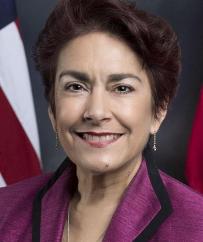TPR shares with permission California Forward's summary of the suite of housing proposals that seek to increase the zoned capacity for housing in the state. SB 1385, the Neighborhood Homes Act, authored by Senator Anna Caballero (D-Salinas, pictured), authorizes residential development on existing lots zoned for commercial and office and retail spaces, such as properties made vacant by shifting consumer habits and exacerbated by the current economic crisis. Find the summary by CA FWD's, Nadine Oro, on their website.

Sen. Anna Caballero
"SB 1385 helps the market to catch up with this real-world reality by authorizing the adaptive reuse of these vacant parcels into desperately needed residential development.”—CA Sen. Anna Caballero
Committee hearings begin this week in the State Senate for a package of bills aimed at increasing housing production and contributing to California’s economic recovery made necessary by the COVID-19 pandemic. One of the bills seeks to make available a potential resource for improving housing affordability — underutilized commercial property.
The Neighborhood Homes Act (SB 1385), authored by Senator Anna Caballero (D-Salinas), authorizes residential development on existing lots zoned for commercial and office and retail spaces, such as properties made vacant by shifting consumer habits and exacerbated by the current economic crisis.
“Every year, the nation witnesses the closure of brick and mortar retailers – anchor tenants at large shopping malls, small strip malls, and large standalone ‘big-box’ retail stores – because of the shift to shopping on the internet,” said Caballero. “SB 1385 helps the market to catch up with this real-world reality by authorizing the adaptive reuse of these vacant parcels into desperately needed residential development.”
SB 1385 addresses one of the priority actions recommended at the California Economic Summit held in Fresno last November to to expand the supply of land for housing development. CA Fwd and the Bay Area Council are leading supporters of the bill, as California is experiencing a severe housing affordability crisis, with an average home costing 2.5 times higher and rents about 50 percent higher than the national average.
With no cost to the state, the bill will do the following:
- Allows residential development on commercially zoned retail and office spaces,
- Requires housing development to meet or exceed the density deemed appropriate to accommodate affordable housing,
- Expands the state’s ministerial housing approval process to include commercial properties that have been vacant or less than 50 percent occupied for at least three years,
- Subjects the development to local zoning, parking and design ordinances.
- Authorizes local governments to establish a Community Finance District to provide for and maintain public infrastructure.
“The bill will expand California’s housing production in the same commercial centers where people shop, get their haircut, and buy other goods and services,” added Cabarello. “This reduces travel by vehicles and creates an opportunity for some Californians to become owners, and lower the cost of housing for renters, by increasing supplies.”
SB 1385 is part of a package of bills authored by a working group of Democratic Senators lead by Senate President pro Tempore Toni Atkins, (D-San Diego). The other bills in the package include:
- SB 902: Allows local governments to pass a zoning ordinance that is not subject to CEQA for projects that allow up to ten units, if they are located in a transit or job rich area or an urban infill site.
- SB 995: Expands the application of streamlining the CEQA process to small housing projects that include at least 15 percent affordable housing.
- SB 1085: Enhances the existing Density Bonus Law by increasing the number of incentives provided to developers in exchange for providing more affordable housing units.
- SB 1120: Encourages small-scale neighborhood development by streamlining the process for a homeowner to create a duplex or subdivide an existing lot in all residential areas.
“This package of legislation would make more housing production possible generating high wage jobs for skilled construction workers, even while we continue to work through the new realities and uncertain times caused by the pandemic and economic downturn,” said Atkins. “And it positions California to leap forward exponentially on affordable housing as times get better.”
SB 1385 will be heard at the Senate Governance and Finance Committee on Thursday, May 28 at 8:30 a.m. For information on submitting written testimony, making a public comment or listening to the hearing, click here.
UPDATE 5/28 - SB 1385 was approved Thursday morning by a 6-0 vote in the Senate Governance and Finance Committee.
"California continues to face an extreme housing affordability crisis," said Senator Anna Caballero (D-Salinas), author of the bill. "The lack of available land for residential development continues to be a challenge. Many our cities are built out or don't have readily available land."
Converting "commercial property makes sense because even prior to the COVID-19 pandemic, many brick-and-mortar businesses were struggling with the growth of e-commerce," said Micah Weinberg, CEO of CA Fwd, a bill co-sponsor with the Bay Area Council.
"That's bipartisan love right there," added committee chair Senate Mike McGuire (D-Healdsburg) upon approval of the bill.
- Log in to post comments



